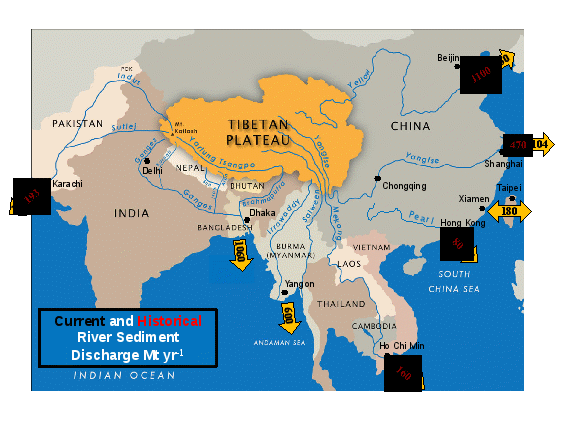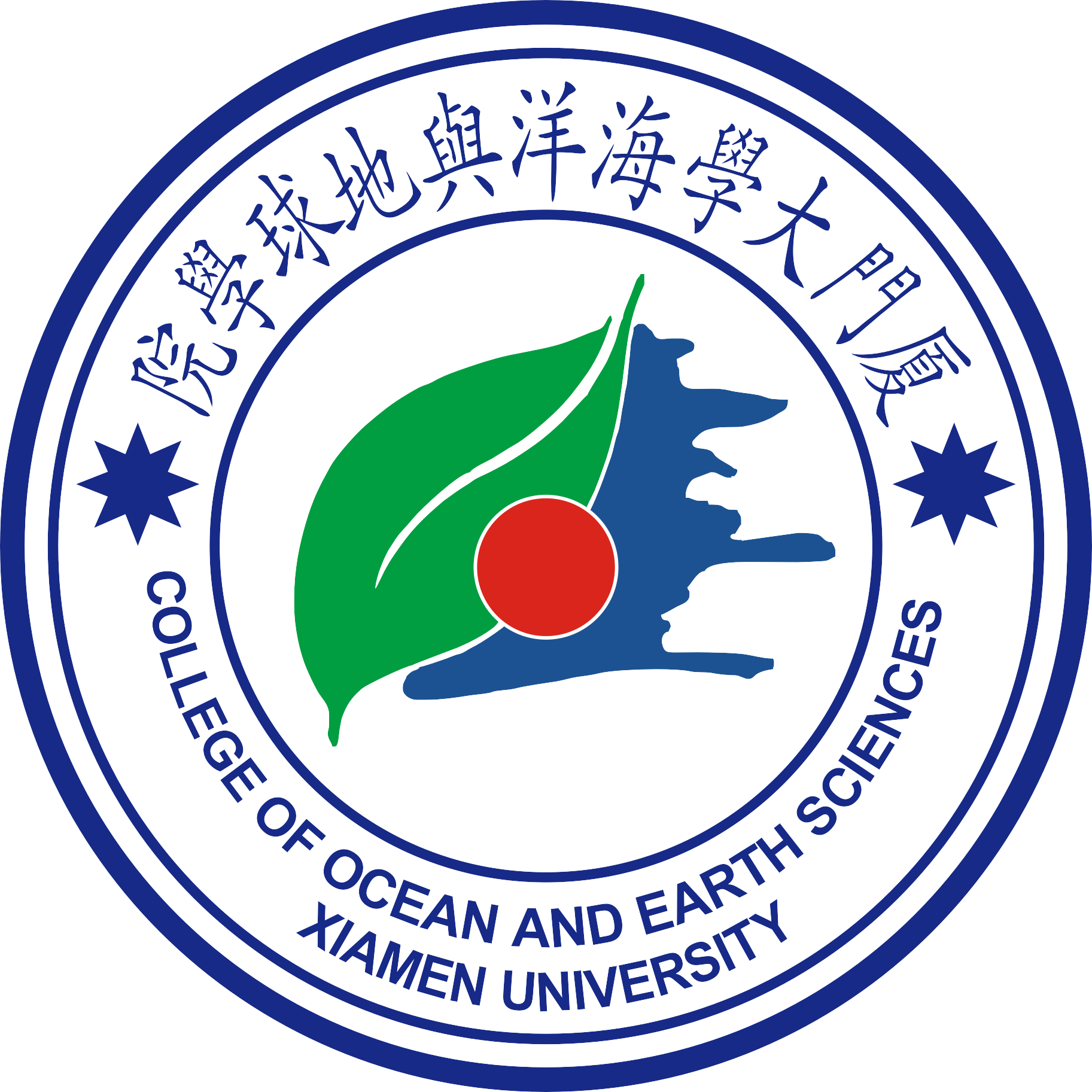October 11-12, 2019. The Asian Sedimentary Continuum (ASC): Toward a Global Perspective. Xiamen University, China.
The Asian Sedimentary Continuum (ASC): Toward a Global Perspective
Workshop Location: Xiamen University, China
Dates: October 11-12, 2019

Summary
This international workshop will outline future research directions and collaborative opportunities for exploring material transport and transformation across Asian continental margins. Asian mega-rivers and inputs from adjacent highstanding islands (e.g., Taiwan) play a disproportionately large role in earth surface processes and together “feed” nearly half the world’s population. Whereas the mega-rivers share a common source (see figure above), they display a contrasting range of human and natural influences on their fate. We aim to develop plans for holistic studies that that consider continental-margin sedimentary systems as a continuum requiring coordinated and linked studies across the margin in order to understand the flux, transformation and burial of dissolved and particulate matter. The timescale of interest spans seconds to millennia in order to consider the continuum of individual events and resulting stratigraphy, with emphasis on trends and trajectories through the Holocene and Anthropocene. This workshop aims to: 1) Identify new and innovative approaches that can be successfully applied to advance studies of Asian margins; 2) Propose candidate research area(s) for integrated, interdisciplinary studies, and; 3) Foster international and interdisciplinary studies that will produce major advances in knowledge over the next decade.
Workshop Sponsors
Department of Geological Oceanography (DGO), Xiamen University
College of Ocean and Earth Sciences, Xiamen University
State Key Laboratory of Marine Environmental Sciences (MEL), Xiamen University
State Key Laboratory of Marine Geology, Tongji University
Institute of Oceanography, Southern University of Science and Technology (SUSTech)





Meeting Conveners
Steven Kuehl, Virginia Institute of Marine Science and Xiamen University
Shouye Yang, Tongji University
Local Organizers
Steven Kuehl, Virginia Institute of Marine Science and Xiamen University
Fengling Yu, Department of Geological Oceanography, Xiamen University
Scientific Steering Committee
Yoann Copard, University of Rouen-Normandy, France
Steven Kuehl, Virginia Institute of Marine Science and Xiamen University
James T. Liu, National Sun Yat-sen University
Charles Nittrouer, University of Washington, USA
Jingping Xu, Southern University of Science and Technology
Shouye Yang, Tongji University
Fengling Yu, Xiamen University
Meeting structure
Time:
October 11-12, 2019 (Sunday morning, October 13 for optional research planning discussions and workshop writeups)
Workshop Location:
Xiamen University, Science and Arts Center, Siming Campus (Hosted by Department of Geological Oceanography)
Main Conference Hotel:
Wutong (Business School) Hotel on Xiamen Siming Campus
Format:
The design of this workshop will be similar to AGU Chapman Conferences, the salient aspects being: 1) to have scientists to gather in a small meeting with the explicit purpose of significantly advancing their field of research; 2) to consider grand challenges in our science and focus on identifying the key, yet solvable, problems; and, 3) to remain goal oriented, i.e., agreeing on solutions or mapping the path toward them.
There will be a relatively small number of presentations and posters, and a focus on break-out groups, which will dissect key topics and present these for discussion in plenary session.
Additional Information:
Posters will be displayed in Multifunction Hall, 1st floor of Science and Arts Center from 11-12 October. Poster board size is for A0 , 90cm wide, 120cm long. Main meeting room will be Conference #4, 2nd floor Science and Arts Center. Campus maps, suggested restaurants, touring information, etc., will be included in your registration package.
Workshop Schedule
Thursday October 10, 2019
1600-1800Meeting Registration, Wutong (Business School) Hotel on Xiamen Siming Campus
1700-1900Icebreaker, Wutong (Business School) Hotel on Xiamen Siming Campus
Friday October 11, 2019
0800Welcoming comments by Profs. Minhan Dai and Kejian Wang
0815Opening comments by meeting conveners and organizers: Steven Kuehl, Shouye Yang and Fengling Yu
Session I – Moving Holistic Sediment Studies Forward
0830 Charles Nittrouer, University of Washington,“Linking past and future investigations of sediment dispersal systems”
0845 Courtney Harris, Virginia Institute of Marine Science, “Sediment transport in coastal environments: advancements in numerical modeling and applications to interdisciplinary problems”
0900 Andrea Ogston, University of Washington, "Modulation of sediment source signals through a tidal river, and impacts on coastal sedimentary processes"
0915 James T. Liu, National Sun Yat-sen University, “Coupling between physical processes and biogeochemical responses along pathways of river plume dispersal”
0930Coffee Break Group Photo
Session II – From Shelf to Slope
1000 Gary Parker, University of Illinois, “Continental shelves: how to get siliclastic sediment on them, and how to get sediment to bypass them”
1015 Toshiki Iwasaki, Hokkaido Unversity, "Autogenic subaqueous mechanism for continental shelf formation associated with clinoform migration: dissolved salt, gravity-driven and wave-supported turbidity currents"
1030 Qian Yu, Nanjing University, “Gravity-driven sediment transport on the inner continental shelf of the South Yellow sea”
1045 Jingping Xu, Southern University of Science and Technology, “Near-realtime monitoring of submarine landslides on continental slope”
1100Break-out Group Discussions
Group A (Room#5) – Stratigraphic Record and Environmental Change
Discussion Leaders: Shouye Yang and Paul Liu
Group B (Room#4) – Key Questions in Sediment Routing from Mountains to Ocean
Discussion Leaders: Gary Parker & Jingping Xu
1200Lunch
Session III - Organic Matter Burial
1330 Tom Bianchi, University of Florida, “Carbon remineralization and burial in the coastal margin: linkages in the Anthropocene”
1345 Minhan Dai, Xiamen University, “Diagnosis of carbon cycling in River-Dominated Ocean Margins”
1400 Christophe Rabouille, CESL, Paris, "Carbon remineralization and burial in river deltas: a case study in the Rhône delta emphasizing extreme events"
1415 Meixun Zhao, Ocean University of China, “Terrestrial biomolecular burial efficiencies on continental margins”
1430Coffee Break
Session IV – Carbon Budgets and Diagenesis
1500 Wolfgang Ludwig, University of Perpignan, “Controls and budgets of riverine sediment, carbon and contaminant fluxes at global and regional scales”
1515 Robert Aller, Stony Brook Unversity, "Elemental fluxes and biogeochemical reactions during sediment transit: concepts of local and 3-D system diagenesis"
1530 Xiting Liu, Ocean University of China,"Authigenic pyrite and sulfur isotope in mud sediments of the East China Sea inner shelf"
1545 Yoann Copard, University of Rouen-Normandy, "The route of fossil organic carbon within the land to sea continuum”
1600 Mark Torres, Rice University, “The autogenic carbon cycle: source to sink coupling between sedimentation and organic matter cycling”
1615Break-out Group Discussions
Group A (Room #4)– Carbon Transformation and Burial from Floodplains to Shelf
Discussion Leaders Tom Bianchi and Meixun Zhao
Group B (Room# 5)– Processes at the Land-Ocean Interface
Discussion Leaders – Shu Gao and Andrea Ogston
1715-1830Poster Presentations
1900-2100Workshop Dinner (Location TBD)
Saturday October 12, 2019
080010-minute summaries of Day-1 breakout group discussions and plenary discussion
Session V - Sediment Dispersal in the China Seas
0845 Houjie Wang, Ocean University of China, “Yellow River-derived sediment input and dispersal system in coastal and shelf sea”
0900 Jeffrey Nittrouer, Rice University, “Universal relation for fine-grained sediment transport: applications to the Yellow River”
0915 Shouye Yang, Tongji University, "An integrated study on the boundary exchange in the Changjiang (Yangtze) Estuary and East China Sea”
0930 Zhifei Liu, Tongji University, “In-situ observation on flux and dynamic processes of fluvial sediment transport in the South China Sea”
0945Coffee Break
Session VI - Human Impacts on From Land-Sea Interactions
1000 Shu Gao, East China Normal University, “Human impacts on rivers and shelves: an overview”
1015 Kimberly Rogers, East Carolina University, “Dams, diversions, dikes and their impact on sediment transfer across the land-sea boundary”
1030 Jianhua Gao, Nanjing University, “Rapid response of the Changjiang (Yangtze) River and East China Sea source-to-sink conveying system to human induced catchment perturbations”
1045 Paul Liu, North Carolina State University, “Fates of sediment transport on the shelf: the Yangtze vs Mekong, and the Ayeyarwady vs Ganges Brahmaputra”
1100Break-out Group Discussions
Group A (Room#4)– Future Research Strategies
Discussion Leaders – Robert Aller and James Liu
Group B (Room#5) – Promising Research Field Areas
Discussion Leaders - Houjie Wang and Chuck Nittrouer
1200Lunch
Session VII – Focus on Deltas
1330 Yongqiang Zong, Hong Kong University, “Current understanding and future research on delta evolution: a case from the Pearl River delta/bay area”
1345 Simon Engelhart, University of Rhode Island, “The importance of understanding relative sea-level changes at temporal scales from minutes to millennia”
1400 Daidu Fan, Tongji University, “Comparison study of late-Quaternary small-river deltaic systems across the Taiwan Straight
1415 Zhongyuan Chen, East China Normal University, “Sedimentary system of the Yangtze delta: how much we do not know?”
1430 Steven Kuehl, Virginia Institute of Marine Science and Xiamen University, “Insight to the offshore development of the last unstudied Asian delta, the Ayeyarwady”
1445Coffee Break
153010-minute summaries of breakout group discussion and plenary discussion
1550Conveners’ Summary and Future Directions in Plenary
1600Free Discussions
1700Formal Workshop Closes
Sunday October 13, 2019
0800Finalize Workshop Report (Conveners, Discussion Leaders and Science Steering Committee), Wutong (Business School) Hotel on Xiamen Siming
Campus
0900-1200 Research Working Group Meetings (TBA as Needed)
List of Poster Presentations (some additions expected)
Lei Bi, Tongji University, “Lithium isotopes reveal the cannibalistic nature of continental weathering and erosion in Changjiang river basin”
Yuan-Pin Chang, National Sun Yat-sen University, “The evolution of depositional environment at Central Taiwan alluvial plain based on carbon indicators”
Yulong Guo, Tongji University, “Geochemistry indicates human activities intensively altered the natural sediment routing processes in the Huanghe (Yellow River)”
Zhigang Guo, Fudan University, “Tracing the sources and fate of mercury in sediments in the large river-dominated estuarine-inner shelf sediments using stable mercury isotopic compositions”
Courtney Harris, Virginia Institute of Marine Science, “Tidal and wave spatial variability in the Andaman Sea and Gulf of Martaban: numerical modeling results”
Shuqing Qiao, 1st Institute, Xiamen, “Sediment characteristics and budget in the East China seas”
Ni Su, Tongji University, “Revisit of radiogenic and stable strontium isotope systematics in mountain streams: constraints about weathering processes”
Aimei Wang, Ocean University of China,“Combined wave-tide actions on bottom sediment resuspension in the southern Yellow Sea”
Yaping Wang, Nanjing University, “Winter storm induced sediment transport along the southern Yellow Sea coasts”
Zhongbo Wang, Qingdao Inst. of Marine Geology, “Paleo-fluvial sedimentation on the shelf of East China Sea and sea-level change since LGM”
Bochao Xu, Ocean University of China, “Using multi-isotopes to assess sedimentary dynamics in the East China Sea”
Fengling Yu, Xiamen University, “About the small land-sea interaction systems in southern China”
Bin Zhao, Ocean University of China, “Burial of sedimentary organic carbon in the Eastern China Marginal Seas”

